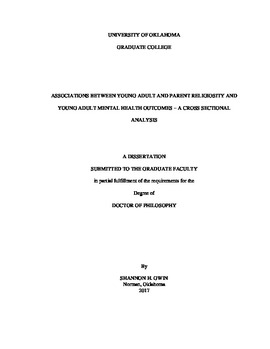| dc.description.abstract | Purpose: The purpose of this study was to examine the relationship between religiosity in young adults and mental health outcomes that include depressive symptoms and suicide ideation, and to examine associations between religious concordance/discordance in young adult/parent pairs and mental health outcomes including depressive symptoms and suicide ideation in a young adult sample. Young adult assets (i.e., relationship with mom, relationship with dad) were also examined to establish influential aspects with the relationship between religiosity and mental health outcomes.
Methods: Self-reported data was collected from young adults aged 18 – 24 years and a parent counterpart during Spring 2017. A 15-minute computer-based survey was administered to young adult and parent pairs in a southwestern state. Recruitment was conducted on college and university campuses. Flyers, newsletters, word-of-mouth marketing, web listings (i.e., Facebook, organizational web pages), mass emails, and in-class recruitment was used. Participants were given the link to survey via email, text, phone calls or face-to-face in the classroom per permission of instructor/professor and approval of college/university IRB approval. The PI requested the young adult to forward the parent survey link to one of their parents via email, text, phone call or face-to-face so that the parent can complete the survey. English version was the only translation provided for the survey. All stored data was anonymous.
Results: This dissertation encompasses three studies involving relationships between religiosity factors and mental health outcomes in emerging adults.
Study 1: The first study examines associations between individual religious beliefs and depressive symptoms and suicide ideation in young adults. Findings suggest significant inverse associations (alpha=0.05) between religious variables and reported depressive symptoms during the last week in young adults. Additionally, higher scores of religiosity subscales were significantly associated with fewer reports of suicide ideation in the last 12 months.
Study 2: The second study examines associations between religious concordance/discordance between young adults and their parent counterparts and depressive symptoms. Findings suggest significant inverse associations between Concordance/Discordance for non-organizational religiosity (e.g. private prayer time, Bible study, or meditation) and depressive symptoms in young adults (p=0.0015). Other variables that displayed significant relationships include gender (p=0.0027) and the relationships with mom (p=0.0075) and dad (p=0.0013).
Study 3: The third study investigates associations between religious concordance/discordance (C/D) between young adults and their parent counterparts and suicide ideation. There were no significant associations were found between C/D religious variables and suicide ideation.
Global Conclusions and Recommendations: With the exception of study 3, overall religiosity beliefs and practices appear to be associated with fewer depressive symptoms and suicide ideation. Inclusion of religious programs may be important to incorporate in emerging adult mental health programming. Future recommendations are discussed.
Key words: Emerging adults, religiosity, mental health, depression, suicide | en_US |
